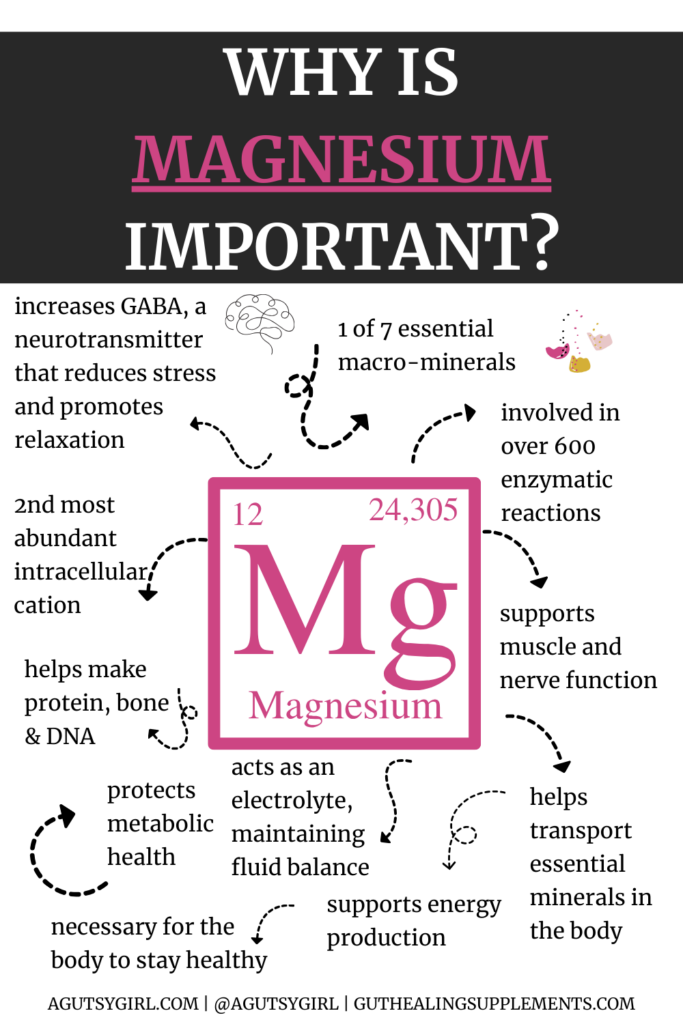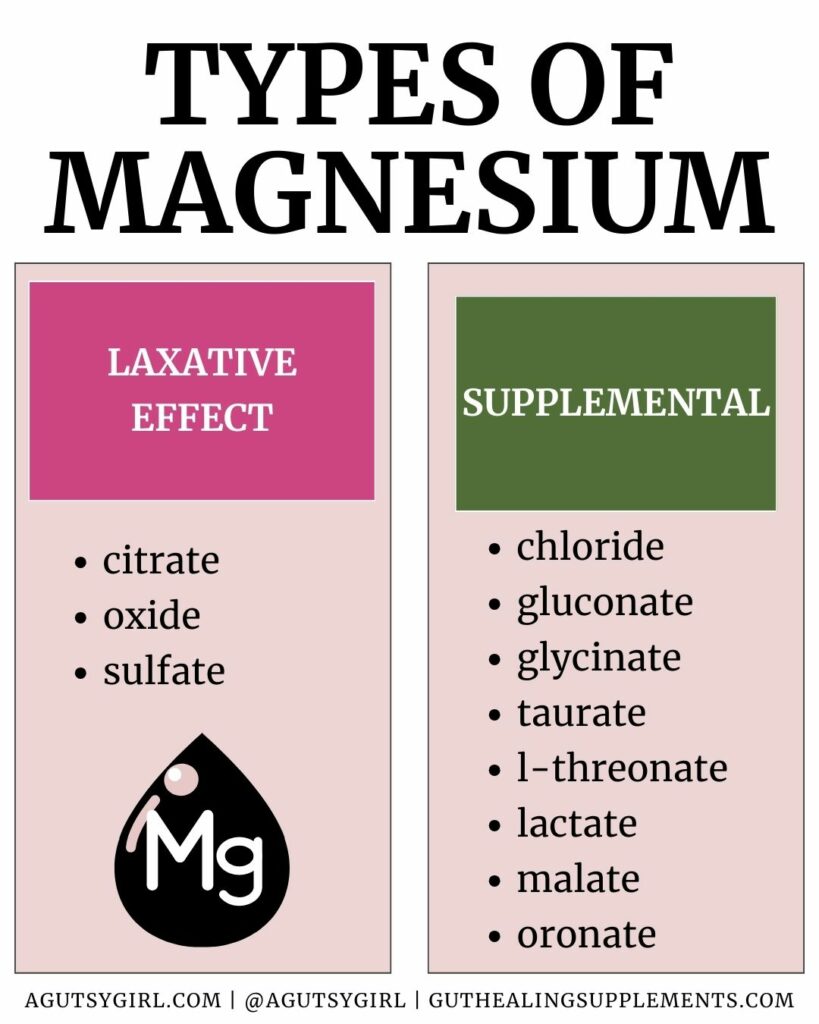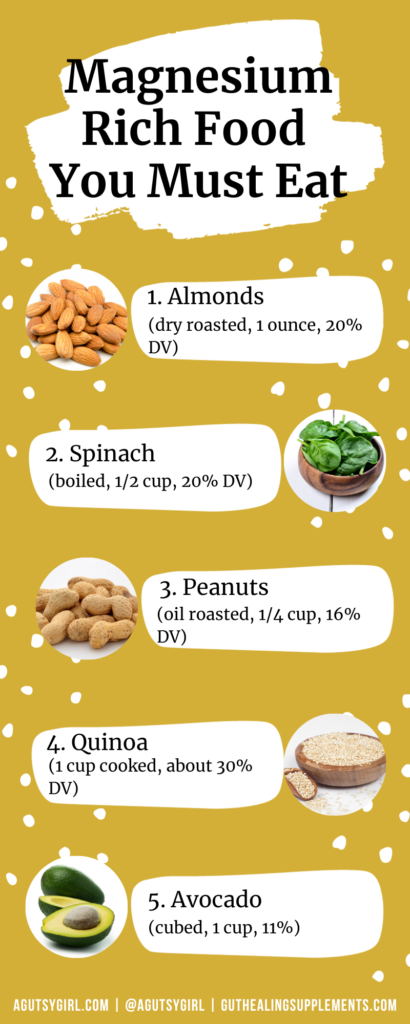Let’s explore the different types of magnesium.
We have explored magnesium together in the past. But magnesium is sort of confusing because there are so many different forms of it.
Besides the fact that we need a lot of it, it is important to note that we use different forms of magnesium for different things (and outcomes).
To begin, I want to stress the importance of magnesium.
Magnesium is a Mineral
First, and this is super basic, albeit important.
Magnesium is a mineral.
Your body requires all essential minerals. However, you need more macro than trace minerals.
Magnesium is a macro mineral.
Macro Minerals
- sodium
- chloride
- potassium
- calcium
- phosphorus
- magnesium
- sulfur
Trace Minerals
And just so you have them, here are the trace (micro) minerals:
- iron
- zinc
- iodine
- selenium
- copper
- manganese
- fluoride
- chromium
- molybdenum
- nickel
- silicon
- vanadium
- cobalt
Today’s star is magnesium. And here’s why it’s so important.

Why is Magnesium Important?
Here are 10 reasons, in simple list format, to prove magnesium’s importance:
- Fact: the body needs it to stay healthy.
- Regulates muscle and nerve function.
- Helps make protein, bone, and DNA.
- It is an essential mineral, and one of the seven essential macro-minerals.
- Supports energy production.
- Is the 2nd most abundant intracellular cation after potassium.
- Helps transport calcium, potassium, and other essential minerals.
- Protects metabolic health, which includes promoting better sleep.
- Magnesium is involved in over 600 enzymatic reactions including energy metabolism and protein synthesis.
- Functions as an electrolyte, maintaining fluid balance in your body.
- Increases GABA (Gamma Aminobutyric Acid, a naturally occurring amino acid that works as a neurotransmitter in your brain), which helps reduce stress and promotes more relaxation.

By the way, whenever I read about number 6 from above, I remember this from The Institute for Integrative Nutrition.
Paul Pitchford noted,
No calcium goes into bones without magnesium.This is why people in China have much stronger bones than people in America: They get a lot more magnesium. They eat a lot less calcium. But the magnesium is key.
You might enjoy that nugget of wisdom, too.
Sources: HERE, HERE, HERE, and HERE.
Without a doubt, it is very important.
But again, there are so many different types of magnesium. Some I have already discussed in great detail; others not so much.
Today it’s time to bring them all to the forefront.
Types of Magnesium {Your Master Guide}
Click HERE to save the types of magnesium for later.

Note: I am grouping the types of magnesium by “laxative” and “supplement” because while the below are all types of magnesium, they definitely don’t act the same.
Magnesium, in general, is more of a supplement.
But for instance Magnesium Citrate, is a laxative. The difference is the dose.
And this distinction is even more important for the Gutsy community, so I chose to break it down even further.
Different Types of Magnesium: Laxative Effect
- Citrate
- Oxide
- Sulfate
Magnesium Citrate C6H6MgO7
This is the most commonly used form of magnesium in laxative form. In fact, While Magnesium Citrate is a type of magnesium, magnesium in general is more of a supplement; the Magnesium Citrate, a laxative. The difference is the dose.
Magnesium citrate is the generic name for over-the-counter products such as Citroma or Citrate of Magnesia, which can be used as a laxative or dietary supplement.
It belongs Magnesium citrate belongs to group of drugs known as saline laxatives, which work by pulling more water into the colon in order to help the colon empty its contents.
I have an entire post dedicated to Magnesium Citrate HERE.
Magnesium Oxide (MgO)
This is the least absorbed form, but also has one of the highest percentages of elemental magnesium per dose so it still may be the highest absorbed dose per mg.
This is a great general purpose magnesium if Mg is all you need. It makes a simple muscle relaxer, nerve tonic and laxative if you take a high dose.
Make note that magnesium citrate is more soluble and bioavailable than magnesium oxide.
Magnesium Sulfate (MgSO4)
Yes, I did put this under the “laxative effect” category because it’s something that not a lot of people know or expect. And the laxative effect can be shocking, if you’re not aware.
If you take it internally, it tastes awful and has a definite laxative effect.
However, Magnesium Sulfate is most widely used and known as Epsom Salts.
In fact, I have a whole post on Epsom Salts HERE.
Epsom Salt baths, due to the Magnesium Sulfate, can help relax your muscles and relieve aches and pains.

Types of Magnesium: Supplemental
- Chloride
- Gluconate
- Glycinate
- Taurate
- L-Threonate
- Lactate
- Malate
- Oronate
Magnesium Chloride (MgCl2)
While Magnesium Chloride can be taken internally, many use it in the flake form for therapeutic baths and foot soaks. Like Magnesium Sulfate, Magnesium Chloride is a salt.
However, I kept this as a “supplemental” vs “laxative effect” because, as one source states,
Magnesium oxide is more likely to cause diarrhea because it is so poorly absorbed and requires a larger dose. On the other end, magnesium glycinate is the best-absorbed form and poses little risk. Magnesium chloride falls somewhere in between.
Magnesium chloride is absorbed almost completely in the gut, increasing its bioavailability in the bloodstream.
It is widely used for: reducing blood pressure and migraines. It might also manage GI issues, and reduce the risk of colorectal cancer.
Magnesium Gluconate (C12H26MgO16)
This form has the highest bioavailability overall. The NIH states,
Although magnesium is available in the form of sulphates, lactate, hydroxide, oxide and chloride, only magnesium gluconate is recommended for magnesium supplementation as it appears to be better absorbed and causes less diarrhea.
This form is for treating and preventing low levels of magnesium in the body.
Magnesium Glycinate (C4H8MgN2O4)
In addition to its calming effect and helping to promote better sleep, magnesium glycinate has been known to help reduce PMS symptoms and control blood sugar in those with diabetes.
The glycinate form is highly bioavailable and less likely to cause diarrhea for sensitive individuals.
Move Now Chelated Magnesium
In the A Gutsy Girl supplement line we offer a product centered around magnesium called Move Now.
This supplement contains chelated magnesium glycinate, otherwise known as magnesium biglycinate.
Magnesium biglycinate is one of the most readily absorbed forms of magnesium and is so incredibly easy on the GI tract.
Its chelation helps bump up the absorption value and reduces interaction with other nutrients.
Other benefits of chelated magnesium include:
- muscle and bone health
- heart health
- energy production
- blood sugar regulation + prevention of type 2 diabetes
- decreased PMS symptoms
- regulation of blood pressure
- better bowel movements
This particular product also helps improve sleep quality.
Magnesium glycinate both relaxes the muscles and can calm down your mind. It also encourages a healthier circadian rhythm which can help you both fall asleep and stay that way.
This not only positively impacts your energy levels but can also increase your memory.
It is recommended to take this supplement right before bed to optimize its benefits.
Magnesium Taurate (C4H12MgN2O6S2)
This form comes from the combination of magnesium oxide and taurine.
Taurine is is an amino acid that is known to feed cardiac muscle and enhance the quality of contractions of the heart.
For those who take magnesium for heart functioning, this is probably the best form.
Magnesium L-Threonate (C8H14MgO10)
The L-Threonate is also written as magnesium threonate.
This form crosses the blood brain barrier and so has recently been studied for uses such as patients with Alzheimer’s disease and other forms of cognitive decline.
Due to the strong brain correlations, it’s also used to help manage help manage certain brain disorders, such as depression and age-related memory loss.
Magnesium Lactate (C6H10MgO6)
Magnesium lactate is the result of magnesium binding with lactic acid to form salt.
It is commonly used for magnesium deficiencies as it’s easily absorbed and mostly tolerated.
The lactate form is very generic, and is also a form of magnesium that’s used as a food additive in fortified or enriched foods.
Magnesium Malate (C4H4MgO5)
Magnesium malate is often recommended for people with fibromyalgia as a treatment for the fatigue and stiffness characteristic of this chronic illness.
While there isn’t scientific evidence for this (studies continue to happen), we do know that supplementing with magnesium (as stating above) can help with many side effects those with fibromyalgia and other chronic illness deal with daily.
Magnesium Oronate (C10H6MgN4O8)
Orotic acid has body composition and DNA implications.
It maintains ATP pool in the body by providing ribose.
Therefore, while some people use it for its magnesium content (to prevent or treat magnesium deficiency) others take it for its orotic acid. The orotic acid namely improves athletic performance and endurance, and for heart health.
However, one source states,
Oronate probably isn’t the best choice as a magnesium supplement for preventing or treating magnesium deficiency because it doesn’t appear to offer an advantage over others and it can cost up to 9 times more than other magnesium products.
Sources: HERE, HERE, HERE, HERE, HERE, HERE, and HERE.
Do You Need a Magnesium Supplement?
I don’t know.
Only you (in conjunction with your doctor or medical provider) know this.

Here’s what you should know, though:
- Magnesium naturally occurs in many foods. See a list HERE.
- If you’re going to supplement with magnesium, be sure you know why you’re supplementing and what for.
- Let’s be honest, many of you want or need the magnesium because – constipation. Now you know what to look for. And by the way, HERE is my DIY constipation lemonade recipe.
- Your journal can help you understand if you might be deficient and bringing the topic up to your healthcare provider.

Types of Magnesium Supplements
If you’re looking for the best magnesium supplement, make sure to source it from a quality place.
So, where to buy the best magnesium supplement?
Here you go.
- Get your magnesium supplement from A Gutsy Girl’s supplement line. This is the magnesium A Gutsy Girl, family, and friends swear by.
- I have some of my favorites recommended via the Supplements tab on the Master Gutsy Spreadsheet.
And that’s a wrap.
Questions? As always, let me know.
If you liked this post, you might also enjoy:
Xox,
SKH
🤰 bloating be gone! weight loss through optimal gut health for women
💃ʜᴇᴀʟ ʏᴏᴜʀ ɢᴜᴛ. ʜᴇᴀʟ ʏᴏᴜʀ ʟɪfe.
🫶🏻 founder gutbyome.com






